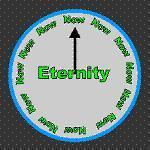

If you aren't confused by quantum physics, you really haven't understood it. (Neils Bohr)
To explain very puzzling quantum phenomena Neils Bohr and Werner Heisenberg provided our world with the 1927 Copenhagen Interpretation of the double slit experiment (see Schrödinger's Cat, 2 January). The Interpretation still stands. It regards as meaningless questions like, Where was the particle before I measured its position? Measurement itself causes wave function collapse. Measurement, then, randomly picks one of the many possibilities allowed, and the wave function instantaneously changes to reflect that pick.
How is it possible that observer/measurement somehow alters that which is observed/measured? Only in movie cartoons do bullets split in order to go through two holes at once to reach the target. The world at the quantum level is cartoonish.
In considering the relationship of observer to the experiment, Wheeler concluded that choice by an observer would determine experiment outcome. And this, regardless of when the choice is made, before or after the "bullet" (particle) is fired. On our "common sense" level this is akin to saying that experimenter choice will determine what a bullet will do after it leaves a gun muzzle.
This is partly how it works:
Fire a photon toward a screen with double slits.
The photon passes through one slit, the other, or both. Presumably whatever the photon does, it does so while passing through the slits.
Past the slits, it heads toward a back wall.
At the back wall, the experimenter has two separate photon detection methods. One is leaving in place a screen while the photon is in transit to the back wall. The other is removing the screen.
After the photon is shooting to the back wall, the experimenter makes a choice to remove the screen or not. This is the delayed choice.
The experiment is much more detailed but the paradox is this. The delayed choice determines whether the particle passed one slit, or the other, or both. The delayed choice of how to measure the particle determined how the particle behaved at an earlier time. The choice seems to have changed the past.
Consider this: Assume a galaxy many light years away with light emitted billions of years ago. In brief, the delayed choice experiment implies that as we observe the light we alter its path. The paradox is that our observation changes the path of light that billions of years ago had already reached the point of our observation. How can the light have been emitted before observation, if the observer can alter what happened before it was observed?
At the quantum level, the experiment has yielded results largely as Wheeler expected them.
We can touch things in space, but that which we call time is inaccessible to us for an explanation. We think of it as real because it helps make sense of a bewildering universe according to the self, objectified by mind.

No comments:
Post a Comment